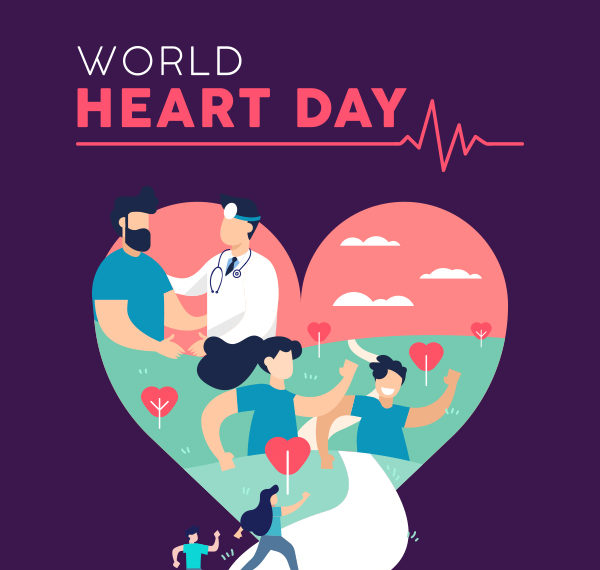“World Heart Day takes place on 29th September every year and is the World Heart Federation‘s and the world’s biggest platform for raising awareness about cardiovascular disease” (World Heart Federation). In light of this, we think it is an ideal time to highlight some myths about heart disease. There are arguably a lot of assumptions that are made about our hearts. As with any health issue, knowledge is power.
Let’s now discuss five major heart health myths and reveal the realities behind them.
Heart Myth #1: I would know if I was having a heart attack.
Most people think that they would know if they are having a heart attack. They believe it would manifest itself with typical symptoms like “sweating, soreness in the left arm and sudden restricting chest pain.” However, this is not always so. Sometimes the signs are very subtle and can also mimic other health conditions.
This can happen to even the most informed persons. Elizabeth Jackson, MD, assistant professor of cardiovascular medicine at the University of Michigan Health Systems, admits to hearing of an instance when a cardiologist was having a heart attack and thought it was indigestion.
Heart Myth #2: The symptoms of a heart attack are the same for men and women.
A heart attack affects men and women in the same way, but both sexes experience different symptoms. Many women even dismiss the symptoms they experience. Dr. John Ryan confirms women’s symptoms are different and advises women to not dismiss heart disease as just a health concern for men only.
Symptoms of a heart attack in men include standard chest pain/pressure, upper body pain or discomfort, rapid or irregular heartbeat, shortness of breath, dizziness and cold sweating. On the other hand, heart attack symptoms for women include unusual fatigue, anxiety, light- headedness, upper back, shoulder or throat pain, jaw pain or pressure or pain in the centre of the chest.
It is also important to note that each heart attack is different. Trust your instincts and check your doctor if you think something is wrong.
Heart Myth #3: I’m too young to worry about heart disease.
A study done by Dr. Henry McGill, senior researcher at Southwest Foundation for Biomedical Research in Texas, has shown that many young people show early signs of heart disease such as blocked arteries due to high cholesterol.
The good news is high cholesterol can be treated through dietary and lifestyle changes and medication. The younger you are, the better it is to make positive and healthy lifestyle choices that may benefit you in the long run.
Heart Myth #4: Exercise is too risky if I have heart disease.
Elizabeth Jackson, MD, assistant professor of cardiovascular medicine at the University of Michigan Health Systems states that after a coronary event, such as a heart attack, people are typically encouraged to get right into rehabilitation and start working out within a two-week period.
Research shows that heart attack survivors who exercise and make other heart-healthy changes live longer than those who don’t. However, it is advised that you first consult your doctor on developing a physical activity plan that is well suited to your needs.
Heart Health Myth #5: Once I have heart disease I have it for life.
Although people with a family history of heart disease are at higher risk, you can take steps to dramatically reduce your risk.
Create an action plan to keep your heart healthy by incorporating these steps into your lifestyle: exercise; control your cholesterol; eat a balanced diet; manage your blood pressure; maintain a healthy weight; control your blood sugar and stop smoking.
Omega 3-6-9 Benefits for Heart Health
Omega-3, omega-6 and omega-9 fatty acids are all important dietary fats. Remarkably, each one has a number of health benefits for your body. It is important, however, to get the right balance of these fatty acids in your diet. Jamieson’s Omega 3-6-9 supplement contains the perfect ratio of essential fatty acids to greatly improve your health. Jamieson’s products are 100% natural and Health Canada approved for quality, safety and efficacy.
Here is a guide to omega-3, -6 and -9 fatty acids, including what they are and why you need them.
Omega-3
Omega-3 supplements have a direct benefit to your health and your heart disease. Omega-3 fatty acids are essential nutrients that are important in preventing and managing heart disease. Findings show that they may help to lower blood pressure, slow the development of plaque in the arteries, reduce the chance of abnormal heart rhythm and reduce the likelihood of heart attack and stroke.
Omega-6
Omega-6 fatty acids are used for reducing the risk of heart disease, lowering total cholesterol levels, lowering LDL (“bad”) cholesterol levels, raising HDL (“good”) cholesterol levels, and reducing cancer risk. Higher blood levels of the omega-6 fatty acid linoleic acid have also been linked to both a lower risk of death and death from cardiovascular disease.
Omega-9
Research has shown that omega-9 fatty acids can help reduce the risk of cardiovascular disease and stroke. Omega-9 fatty acids benefit heart health because they have been shown to increase HDL cholesterol and decrease LDL cholesterol levels. This, in turn, may help eliminate plaque build-up in the arteries, which is one of the leading causes of heart attacks and strokes.
For many people, supplementing their omegas is the best way to get an adequate amount of each one. Jamieson’s Omega 3-6-9 is clinically proven to reduce cholesterol and can improve your overall heart health, making it the ideal choice for an omega supplement.
